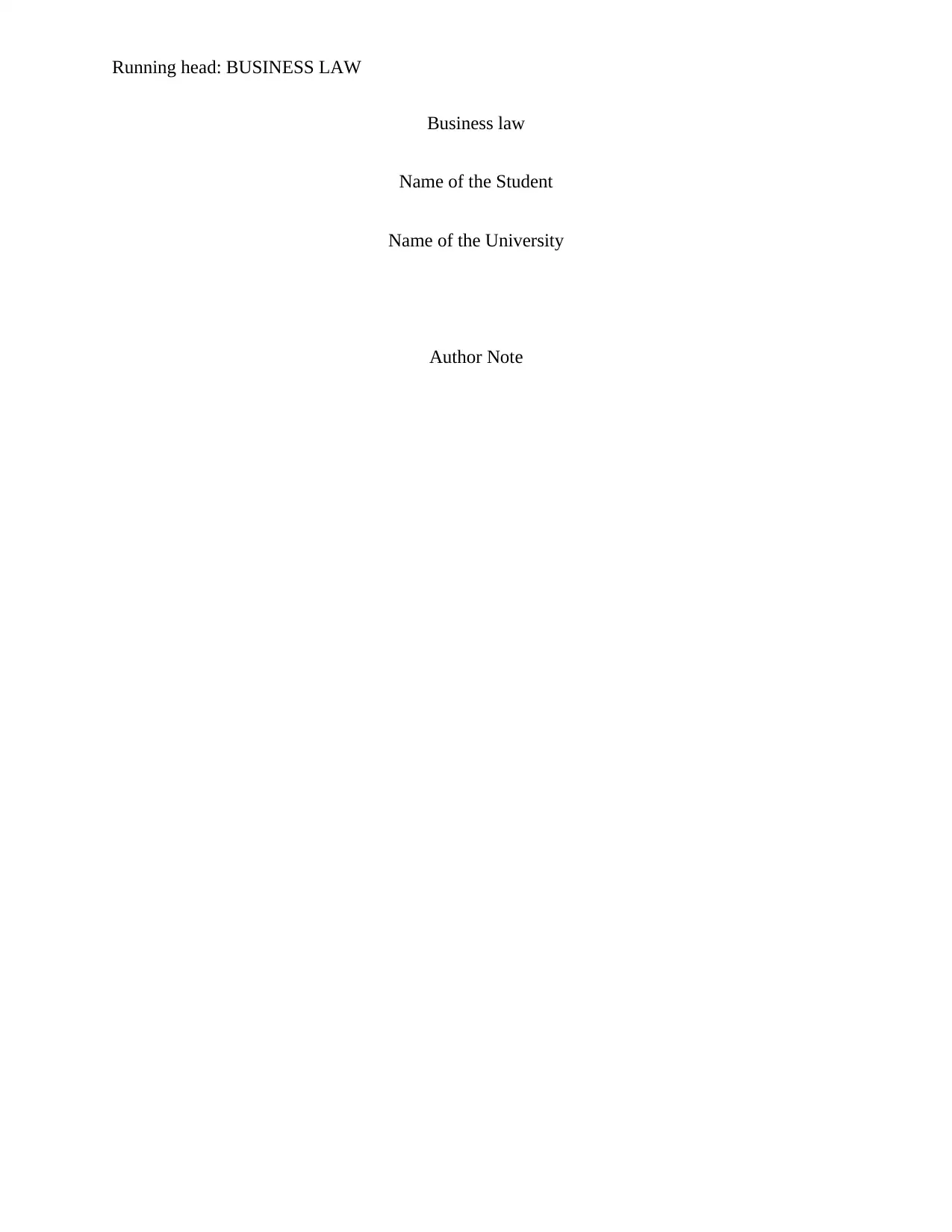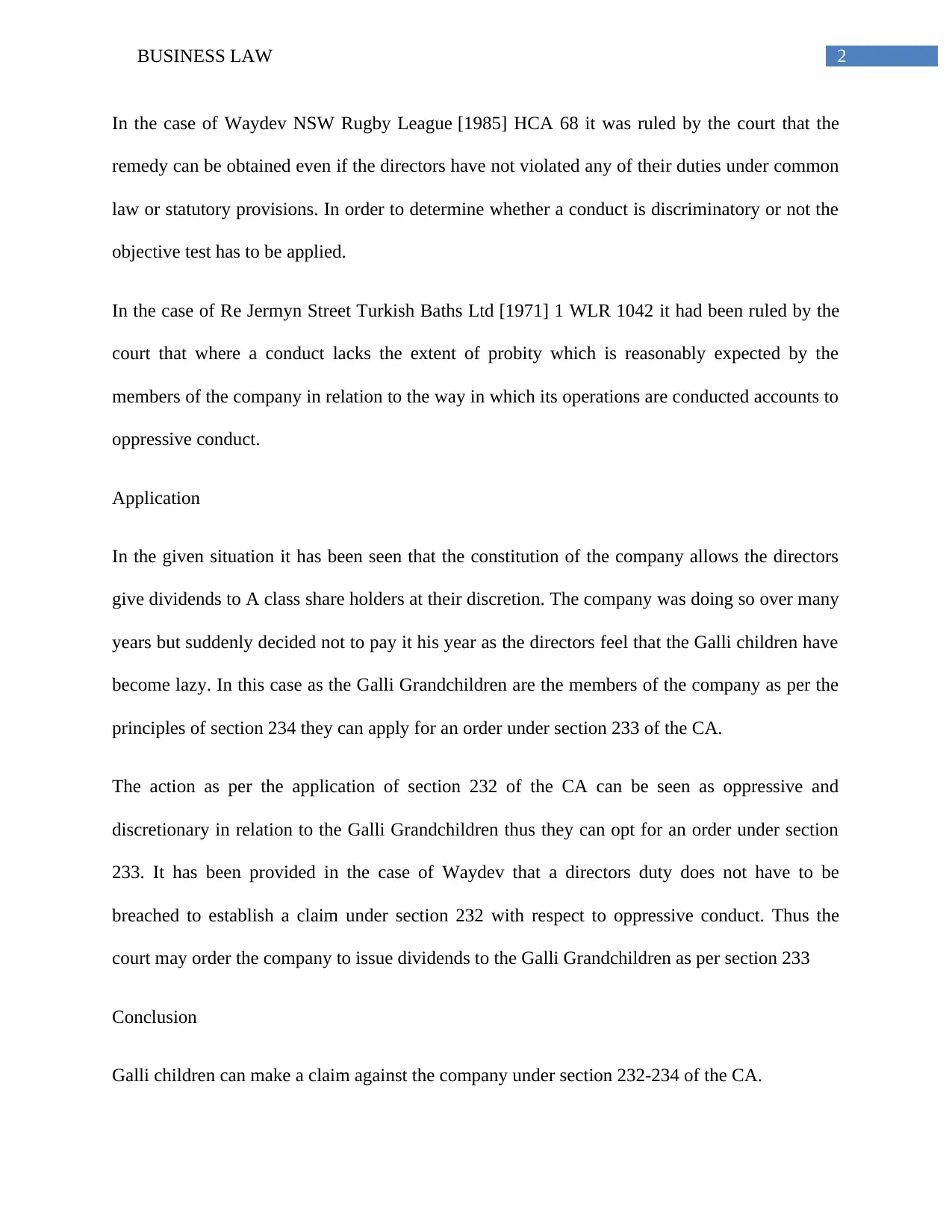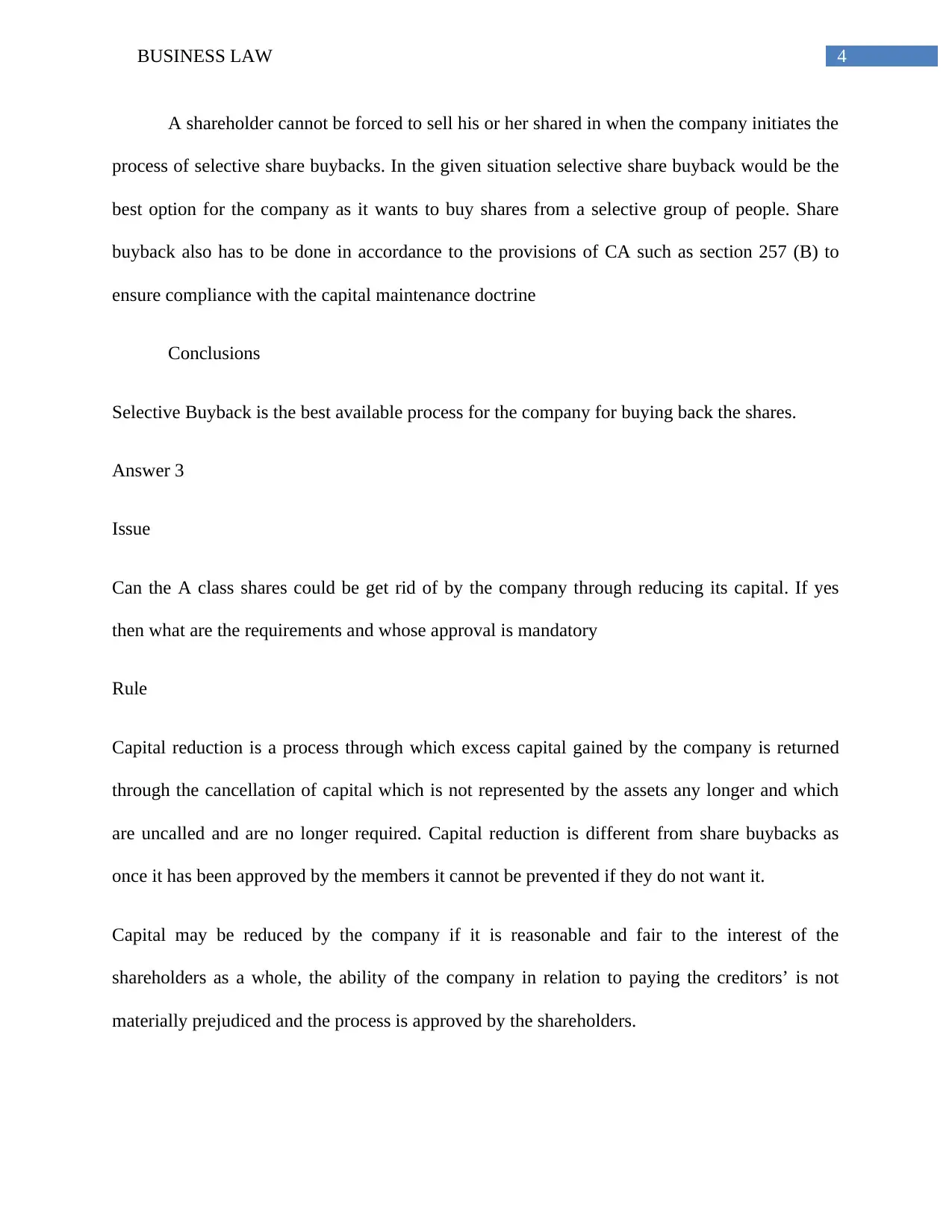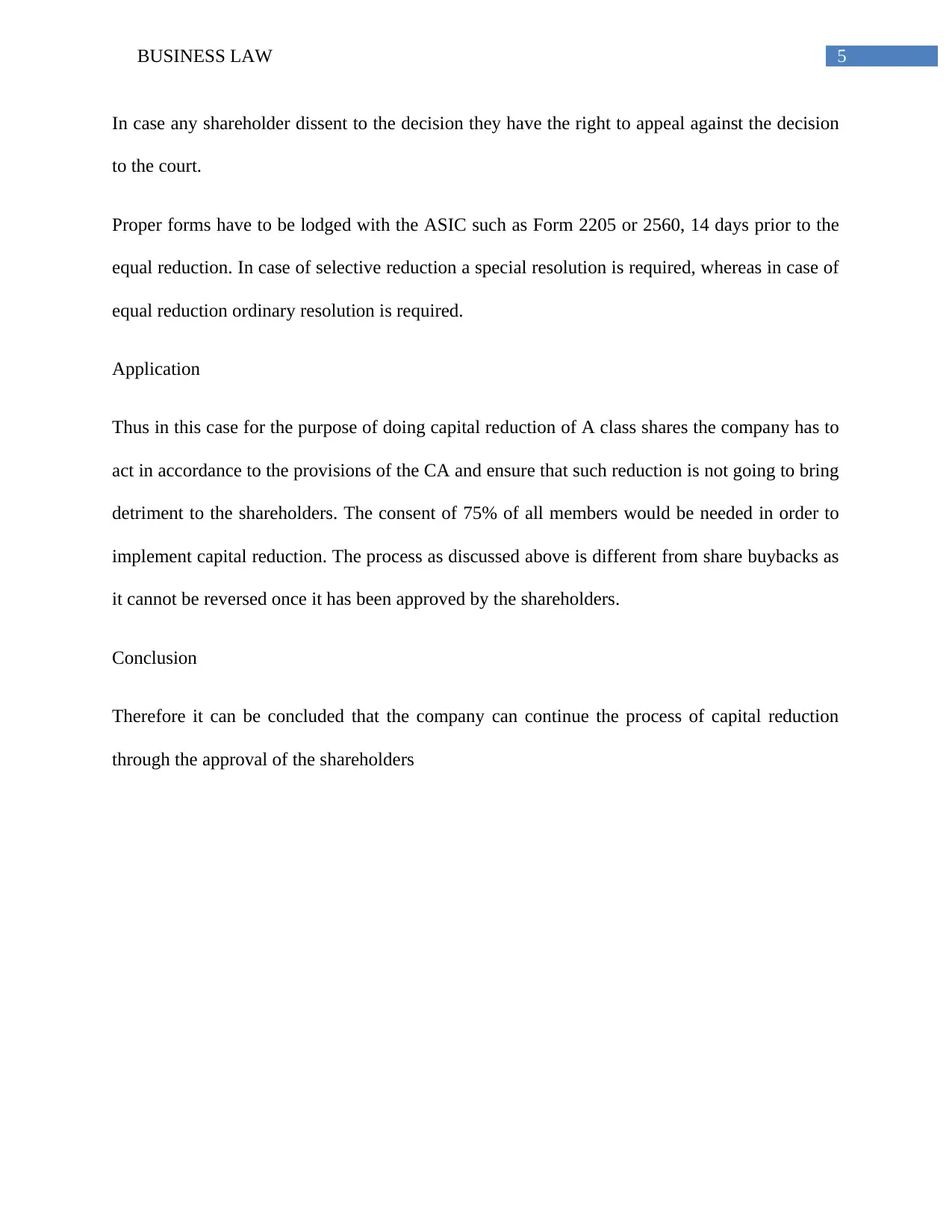Business Law: Shareholder Disputes and Capital Reduction
VerifiedAdded on 2020/03/04
|7
|1276
|54
Homework Assignment
AI Summary
This business law assignment examines three key issues: the rights of minority shareholders regarding non-payment of dividends, the process of share buybacks (particularly selective buybacks), and the possibility of a company eliminating A class shares through capital reduction. The analysis references the Corporation Act 2001 (Cth) and relevant case law, including Waydev NSW Rugby League and Re Jermyn Street Turkish Baths Ltd, to determine whether the Galli Grandchildren can take legal action, the best approach for a company's selective share buyback, and the requirements for capital reduction. The assignment explores shareholder oppression, discretionary dividend payments, and the legal implications of each scenario, concluding with recommendations for the company's actions in each case.

Running head: BUSINESS LAW
Business law
Name of the Student
Name of the University
Author Note
Business law
Name of the Student
Name of the University
Author Note
Paraphrase This Document
Need a fresh take? Get an instant paraphrase of this document with our AI Paraphraser

1BUSINESS LAW
Answer 1
Issue
The issue in this case is to determine whether Galli Grandchildren can take any legal action in
relation to the non-payment of dividends.
Rule
The Corporation Act 2001 (Cth) provides protection to the minority shareholders of a company
through its provisions against any oppressive actions by the directors of the company
As provided through the Section 232 of the CA the court has the jurisdiction of making an order
as provided through section 233 of the CA in case the operations of the company, or any
proposed act or omission or resolution in relation to the company is to the detriment of the
interest of the shareholders as whole or is discriminatory, oppressive or prejudicial unfairly in
relation to a member or group of members of the company.
Affair is any activity which is carried on in relation to the operations of the company as per the
provisions of section 53 of the CA.
Section 233 of the CA provides that the orders in relation to section 232 can be anything which is
found to be appropriate by the court and also includes an order to Wind up the company,
modification or repealing the existing constitution of the company, regulating the way in which
the operations of the company are carried out, an order to purchase shares by reducing the share
capital of the organization, legal action to be taken by the company, appointment of receiver,
injunctions and orders of specific performance. Section 234 of the CA provides that any person
who is a member of the company can apply for an order under section 233.
Answer 1
Issue
The issue in this case is to determine whether Galli Grandchildren can take any legal action in
relation to the non-payment of dividends.
Rule
The Corporation Act 2001 (Cth) provides protection to the minority shareholders of a company
through its provisions against any oppressive actions by the directors of the company
As provided through the Section 232 of the CA the court has the jurisdiction of making an order
as provided through section 233 of the CA in case the operations of the company, or any
proposed act or omission or resolution in relation to the company is to the detriment of the
interest of the shareholders as whole or is discriminatory, oppressive or prejudicial unfairly in
relation to a member or group of members of the company.
Affair is any activity which is carried on in relation to the operations of the company as per the
provisions of section 53 of the CA.
Section 233 of the CA provides that the orders in relation to section 232 can be anything which is
found to be appropriate by the court and also includes an order to Wind up the company,
modification or repealing the existing constitution of the company, regulating the way in which
the operations of the company are carried out, an order to purchase shares by reducing the share
capital of the organization, legal action to be taken by the company, appointment of receiver,
injunctions and orders of specific performance. Section 234 of the CA provides that any person
who is a member of the company can apply for an order under section 233.

2BUSINESS LAW
In the case of Waydev NSW Rugby League [1985] HCA 68 it was ruled by the court that the
remedy can be obtained even if the directors have not violated any of their duties under common
law or statutory provisions. In order to determine whether a conduct is discriminatory or not the
objective test has to be applied.
In the case of Re Jermyn Street Turkish Baths Ltd [1971] 1 WLR 1042 it had been ruled by the
court that where a conduct lacks the extent of probity which is reasonably expected by the
members of the company in relation to the way in which its operations are conducted accounts to
oppressive conduct.
Application
In the given situation it has been seen that the constitution of the company allows the directors
give dividends to A class share holders at their discretion. The company was doing so over many
years but suddenly decided not to pay it his year as the directors feel that the Galli children have
become lazy. In this case as the Galli Grandchildren are the members of the company as per the
principles of section 234 they can apply for an order under section 233 of the CA.
The action as per the application of section 232 of the CA can be seen as oppressive and
discretionary in relation to the Galli Grandchildren thus they can opt for an order under section
233. It has been provided in the case of Waydev that a directors duty does not have to be
breached to establish a claim under section 232 with respect to oppressive conduct. Thus the
court may order the company to issue dividends to the Galli Grandchildren as per section 233
Conclusion
Galli children can make a claim against the company under section 232-234 of the CA.
In the case of Waydev NSW Rugby League [1985] HCA 68 it was ruled by the court that the
remedy can be obtained even if the directors have not violated any of their duties under common
law or statutory provisions. In order to determine whether a conduct is discriminatory or not the
objective test has to be applied.
In the case of Re Jermyn Street Turkish Baths Ltd [1971] 1 WLR 1042 it had been ruled by the
court that where a conduct lacks the extent of probity which is reasonably expected by the
members of the company in relation to the way in which its operations are conducted accounts to
oppressive conduct.
Application
In the given situation it has been seen that the constitution of the company allows the directors
give dividends to A class share holders at their discretion. The company was doing so over many
years but suddenly decided not to pay it his year as the directors feel that the Galli children have
become lazy. In this case as the Galli Grandchildren are the members of the company as per the
principles of section 234 they can apply for an order under section 233 of the CA.
The action as per the application of section 232 of the CA can be seen as oppressive and
discretionary in relation to the Galli Grandchildren thus they can opt for an order under section
233. It has been provided in the case of Waydev that a directors duty does not have to be
breached to establish a claim under section 232 with respect to oppressive conduct. Thus the
court may order the company to issue dividends to the Galli Grandchildren as per section 233
Conclusion
Galli children can make a claim against the company under section 232-234 of the CA.
⊘ This is a preview!⊘
Do you want full access?
Subscribe today to unlock all pages.

Trusted by 1+ million students worldwide

3BUSINESS LAW
Answer 2
Issue
The issue in this part is to analyze the process of share buyback and particularly selective
buyback.
Rules
Under certain circumstances share-buyback is allowed by law. A shareholder has the choice of
accepting or refusing the buyback. There are specific buy back which have to be approved by the
members through a resolution such as selective buyback and large buyback.
Selective buy-back in n offer made only to selected shareholders. In case of a selective buyback
a special resolution by the members is needed this requires an approval from 75% of the
members. In addition in such cases restriction related to voting are also applicable which means
that selling shareholders and their associates cannot take part in the booking process. The shares
then need to be cancelled and notified to the ASIC.
There must be a notice which contains all material information in relation to the buyback
resolution to the shareholders in case if selective buy-backs.
Share buyback means to purchase the shares from the shareholders by the company and forfeit
such shares through notification to the ASIC. The risk of insolvency in increased by the process
of selective buy back
Application
Answer 2
Issue
The issue in this part is to analyze the process of share buyback and particularly selective
buyback.
Rules
Under certain circumstances share-buyback is allowed by law. A shareholder has the choice of
accepting or refusing the buyback. There are specific buy back which have to be approved by the
members through a resolution such as selective buyback and large buyback.
Selective buy-back in n offer made only to selected shareholders. In case of a selective buyback
a special resolution by the members is needed this requires an approval from 75% of the
members. In addition in such cases restriction related to voting are also applicable which means
that selling shareholders and their associates cannot take part in the booking process. The shares
then need to be cancelled and notified to the ASIC.
There must be a notice which contains all material information in relation to the buyback
resolution to the shareholders in case if selective buy-backs.
Share buyback means to purchase the shares from the shareholders by the company and forfeit
such shares through notification to the ASIC. The risk of insolvency in increased by the process
of selective buy back
Application
Paraphrase This Document
Need a fresh take? Get an instant paraphrase of this document with our AI Paraphraser

4BUSINESS LAW
A shareholder cannot be forced to sell his or her shared in when the company initiates the
process of selective share buybacks. In the given situation selective share buyback would be the
best option for the company as it wants to buy shares from a selective group of people. Share
buyback also has to be done in accordance to the provisions of CA such as section 257 (B) to
ensure compliance with the capital maintenance doctrine
Conclusions
Selective Buyback is the best available process for the company for buying back the shares.
Answer 3
Issue
Can the A class shares could be get rid of by the company through reducing its capital. If yes
then what are the requirements and whose approval is mandatory
Rule
Capital reduction is a process through which excess capital gained by the company is returned
through the cancellation of capital which is not represented by the assets any longer and which
are uncalled and are no longer required. Capital reduction is different from share buybacks as
once it has been approved by the members it cannot be prevented if they do not want it.
Capital may be reduced by the company if it is reasonable and fair to the interest of the
shareholders as a whole, the ability of the company in relation to paying the creditors’ is not
materially prejudiced and the process is approved by the shareholders.
A shareholder cannot be forced to sell his or her shared in when the company initiates the
process of selective share buybacks. In the given situation selective share buyback would be the
best option for the company as it wants to buy shares from a selective group of people. Share
buyback also has to be done in accordance to the provisions of CA such as section 257 (B) to
ensure compliance with the capital maintenance doctrine
Conclusions
Selective Buyback is the best available process for the company for buying back the shares.
Answer 3
Issue
Can the A class shares could be get rid of by the company through reducing its capital. If yes
then what are the requirements and whose approval is mandatory
Rule
Capital reduction is a process through which excess capital gained by the company is returned
through the cancellation of capital which is not represented by the assets any longer and which
are uncalled and are no longer required. Capital reduction is different from share buybacks as
once it has been approved by the members it cannot be prevented if they do not want it.
Capital may be reduced by the company if it is reasonable and fair to the interest of the
shareholders as a whole, the ability of the company in relation to paying the creditors’ is not
materially prejudiced and the process is approved by the shareholders.

5BUSINESS LAW
In case any shareholder dissent to the decision they have the right to appeal against the decision
to the court.
Proper forms have to be lodged with the ASIC such as Form 2205 or 2560, 14 days prior to the
equal reduction. In case of selective reduction a special resolution is required, whereas in case of
equal reduction ordinary resolution is required.
Application
Thus in this case for the purpose of doing capital reduction of A class shares the company has to
act in accordance to the provisions of the CA and ensure that such reduction is not going to bring
detriment to the shareholders. The consent of 75% of all members would be needed in order to
implement capital reduction. The process as discussed above is different from share buybacks as
it cannot be reversed once it has been approved by the shareholders.
Conclusion
Therefore it can be concluded that the company can continue the process of capital reduction
through the approval of the shareholders
In case any shareholder dissent to the decision they have the right to appeal against the decision
to the court.
Proper forms have to be lodged with the ASIC such as Form 2205 or 2560, 14 days prior to the
equal reduction. In case of selective reduction a special resolution is required, whereas in case of
equal reduction ordinary resolution is required.
Application
Thus in this case for the purpose of doing capital reduction of A class shares the company has to
act in accordance to the provisions of the CA and ensure that such reduction is not going to bring
detriment to the shareholders. The consent of 75% of all members would be needed in order to
implement capital reduction. The process as discussed above is different from share buybacks as
it cannot be reversed once it has been approved by the shareholders.
Conclusion
Therefore it can be concluded that the company can continue the process of capital reduction
through the approval of the shareholders
⊘ This is a preview!⊘
Do you want full access?
Subscribe today to unlock all pages.

Trusted by 1+ million students worldwide

6BUSINESS LAW
References
Corporation Act 2001 (Cth)
Waydev NSW Rugby League [1985] HCA 68
Re Jermyn Street Turkish Baths Ltd [1971] 1 WLR 1042
References
Corporation Act 2001 (Cth)
Waydev NSW Rugby League [1985] HCA 68
Re Jermyn Street Turkish Baths Ltd [1971] 1 WLR 1042
1 out of 7
Related Documents
Your All-in-One AI-Powered Toolkit for Academic Success.
+13062052269
info@desklib.com
Available 24*7 on WhatsApp / Email
![[object Object]](/_next/static/media/star-bottom.7253800d.svg)
Unlock your academic potential
Copyright © 2020–2026 A2Z Services. All Rights Reserved. Developed and managed by ZUCOL.





